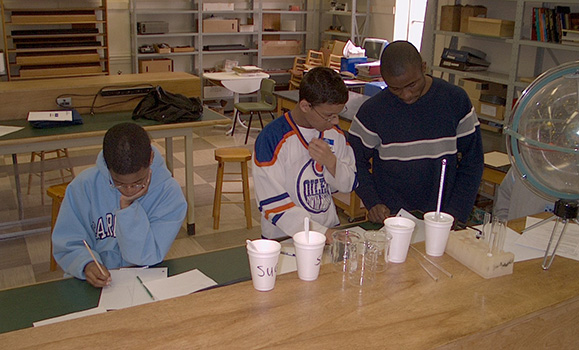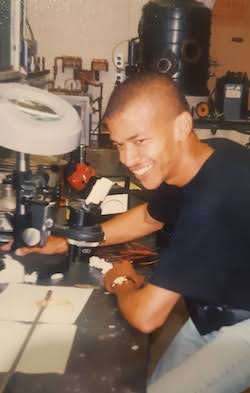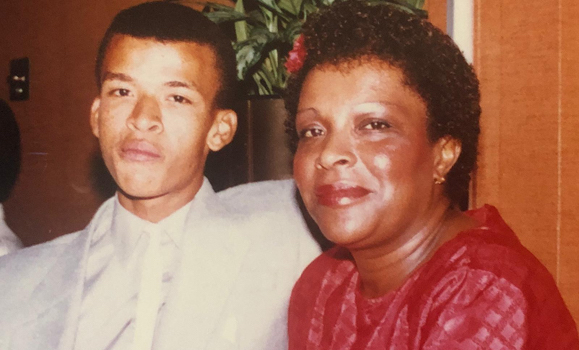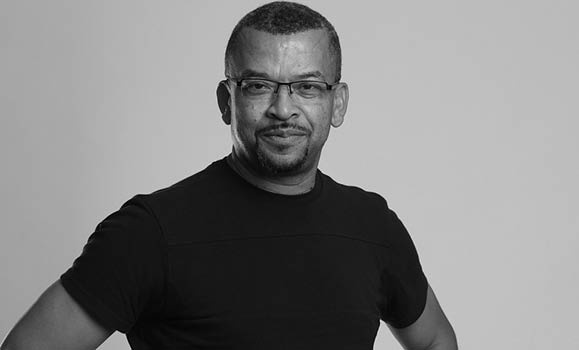Sciographies is a radio show and podcast about the people who make science happen, presented by The Faculty of Science and campus-community radio station CKDU 88.1 FM. This is the seventh article in a series that features excerpts from each new episode released this fall.
At age 10, Kevin Hewitt left Saint Vincent and the Grenadines to immigrate to Canada. Although he was considered a top student in Saint Vincent, he was held back a year when he entered the Canadian education system. Despite the difficulties he faced while adjusting to his new home, he overcame obstacles and pursued degrees in biology and physics.
Today, Dr. Hewitt is a professor in the Department of Physics and Atmospheric Science. His research involves designing optical diagnostic tools for disease detection.
Outside of his scientific endeavours, he’s passionate about increasing the representation of Black professionals in STEM fields. He was a graduate student when his commitment to this work began with the earliest vision of Imhotep’s Legacy Academy, which is now a province-wide community partnership that helps to improve student success for youth of African heritage in Nova Scotia.

Brochure from Imhotep's Legacy first event in Vancouver, B.C. on June 5, 1999. (Dr. Kevin Hewitt image)
As the Faculty of Science’s first Associate Dean of Equity and Inclusion, Dr. Hewitt continues his efforts. In another first, last month the Natural Sciences and Engineering Research Council of Canada named him an inaugural Atlantic-region co-chair for Inclusion in Science & Engineering.

First engagement with African Nova Scotian students in a physics lab in the Sir James Dunn building in summer 2003. (Dr. Kevin Hewitt photo)
In this week’s episode of Sciographies, Dr. Hewitt talks to Sciographies host David Barclay about coming to Canada, his mother’s influence on his success, and pursuing research related to health outcomes for African Canadians.
Listen to a preview of Dr. Hewitt’s episode
Here are some excerpts from the episode, edited for clarity and length.
Building community
Barclay: Were you doing things outside of [academics] to try to solidify your identity?
Hewitt: One of the things that was really important to my mother was that we have a strong sense of identity and understand where we come from… She was quite involved in community. And remember, this is a woman working two jobs and still finding time to contribute to the community. One of my first experiences [in community work] was being a counsellor for the Harriet Tubman Day Camp… At that camp, we were trying to share the history of people of African descent with the campers. So, I had to learn a great deal — and that material is not in the curriculum. I was very eager to learn and pass that on to the kids in the camp.
camp, we were trying to share the history of people of African descent with the campers. So, I had to learn a great deal — and that material is not in the curriculum. I was very eager to learn and pass that on to the kids in the camp.
When I left the camp, I was quite involved in creating on-campus groups to reduce that sense of isolation. So, you know, as president of the African Caribbean Student Association at University of Toronto, I brought in lots of history and education around the black experience. When I left [for graduate school], it was my first time away from family and I remember the parting was tearful. When I arrived in B.C., I felt quite isolated. I needed something. So, I co-founded the Association of Students of African Descent.
Physics for health outcomes
Barclay: Just to get it clear in my mind here — you have a ligand that you know is going to attach to this receptor. Attached to the ligand is a nanoparticle, which is a single atom of a metal. And now you're talking about putting some sort of treatment delivery on this microscopic spaceship?
Hewitt: [laughs] Yes… It’s a nanoscopic spaceship. We showed that this theragnostic particle —a dual-function particle combining therapy and diagnosis — could really be effective in treating triple negative breast cancer… I’m pursuing work that’s related to health outcomes for African Canadians, people of African descent. Triple negative breast cancer disproportionately affects black women… We showed that, in cell culture, this theragnostic particle can kill the triple negative breast cancer cells while keeping the normal cells healthy.
Leading the way
Barclay: [In your role as Associate Dean, Equity and Inclusion] are you starting to take all of your life experiences and formulate them into advice for people like me — other professors who are relatively junior — around how to make concrete decisions to improve equity, diversity, and inclusion (EDI)?
Hewitt: As a faculty member, we have to identify, within our own area of responsibility, what the barriers [to access] are… I realized that it takes more than an individual to accomplish [EDI]. And that's why we’re starting with education through the Faculty of Science Equity Champion program. Right now, there are 30 faculty, staff, and students who are involved in this EDI training certificate… These EDI champions represent different identities and disciplines to help each department and bring that perspective to research and teaching. As the African proverb says, you can go fast alone, or you can go far together.

Dr. Hewitt with his mother, Joan.
Listen to the entire episode of Sciographies at 4:30 PM today on CKDU 88.1 FM in Halifax or find it on Apple Podcasts, Spotify, Google and other popular podcasting platforms. You can also listen to previous Sciographies episodes on the same platforms or at soundcloud.ca/sciographies and dal.ca/sciographie

